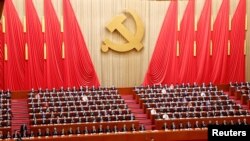ປະທານປະເທດຈີນ ສີ ຈິ້ນຜິງ ໄດ້ເນັ້ນຢ້ຳຄືນ ຄວາມໝັ້ນໝາຍຂອງທ່ານ ຕໍ່ລັດຖະບານ ກ່ຽວກັບນະໂຍບາຍ ສູນກໍລະນີໂຄວິດ ໃນລະຫວ່າງການກ່າວຄຳປາໄສຕໍ່ກອງປະຊຸມໃຫຍ່ພັກຄອມມິວນິສຈີນ ຄັ້ງທີ 20 ໃນວັນອາທິດວານນີ້.
ບັນດານັກວິເຄາະ ກ່າວວ່າ ຄຳປາໄສນັ້ນ ອາດເຮັດໃຫ້ຫຼາຍຄົນຜິດຫວັງ ຜູ້ທີ່ຫວັງວ່າ ທ່ານສີ ຄວນຍົກເລີກຂໍ້ຈຳກັດ ທີ່ເຄັ່ງຂັດຕ່າງໆ ຊຶ່ງໄດ້ປິດກັ້ນຊ່າວຕ່າງຊາດທັງຫຼາຍ ແລະໄດ້ເຮັດໃຫ້ການເຕີບໂຕຂອງເສດຖະກິດ ຊັກຊ້າລົງ. ນະໂຍບາຍດັ່ງກ່າວ ຖືກຕ້ອງຕິວ່າ ມີສ່ວນເຮັດໃຫ້ເກີດບັນຫາການສະໜອງສິນຄ້າໃນທົ່ວໂລກ ຂາດແຄນເຄື່ອງຂອງ ແລະເຮັດໃຫ້ການຟື້ນຕົວໃນພາກການບິນແລະພາກການທ່ອງທ່ຽວຊັກຊ້າລົງ.
ທ່ານຊາຍມອນ ເສິນ (Simon Chen) ອາຈານສອນລັດຖະສາດ ຢູ່ທີ່ມະຫາ ວິທະຍາໄລແຫ່ງຊາດໄຕ້ຫວັນ ໄດ້ກ່າວວ່າ “ເຖິງແມ່ນ ໝົດທຸກຄົນສາມາດເຫັນໄດ້ວ່າ ການເຕີບໂຕຂອງເສດຖະກິດ ໄດ້ຫລຸດລົງກໍຕາມ ເພິ່ນຍັງຢາກຈະສືບຕໍ່ນະໂຍບາຍສູນໂຄວິດຢູ່. ອັນນີ້ ຈະເຮັດໃຫ້ການເປັນຢູ່ຂອງປະຊາຊົນຍາກລຳບາກ.”
ສ່ວນບັນດານັກສັງເກດການ ໄດ້ຄາດຄະເນວ່າ ເຖິງແມ່ນວ່າ ອັດຕາການຕິດ ເຊື້ອແລະການເສຍຊີວິດ ແມ່ນຕ່ຳຫຼາຍແລ້ວກໍຕາມ ຈີນກໍບໍ່ເປີດຊາຍແດນຂອງຕົນຄືນໃໝ່ ແລະກັບຄືນສູ່ຊີວິດປົກກະຕິຄືນຄືເກົ່າ ຍ້ອນປັກກິ່ງ ປະຕິເສດບໍ່ອະນຸຍາດໃຫ້ນຳເຂົ້າຢາວັກຊີນທັງຫຼາຍທີ່ໄດ້ຖືກນຳໃຊ້ຢ່າງກວ້າງຂວາງ ຊຶ່ງຜະລິດໂດຍບັນດາບໍລິສັດຂອງປະເທດຕາເວັນຕົກ ເຊັ່ນວ່າ ຟາຍເຊີ-ໄບໂອເອັນເທັກ (Pfizer-BioNtech) ແລະ ໂມເດີນາ (Moderna).
ຈີນ ໄດ້ໃຊ້ຢາວັກຊີນທີ່ຜະລິດພາຍໃນປະເທດ ແລະບັນດານັກສັງເກດການບາງຄົນ ເຫັນວ່າ ການທີ່ທ່ານສີ ເນັ້ນໜັກເຖິງນະໂຍບາຍສູນໂຄວິດນັ້ນ ເປັນຫຼັກຖານທີ່ລັດຖະບານຂອງທ່ານ ບໍ່ເຊື່ອວ່າ ຢາວັກຊີນທັງຫຼາຍຂອງຕົນ ຈະບໍ່ສາມາດປົກປ້ອງຕໍ່ຄື້ນຟອງຂອງການຕິດແປດໄດ້ ທີ່ຖືກຄາດການໄວ້ວ່າ ຈະເກີດຂຶ້ນໃນລະດູໜາວນີ້.
“ຖ້າເພິ່ນຍົກເລີກນະໂຍບາຍນີ້ ບັນຫາໃຫຍ່ ອາດຈະເກີດຂຶ້ນ” ທ່ານເສິນ ກ່າວ ໂດຍກ່າວຕືມວ່າ ຈີນອາດຍັງພະຍາຍາມໃຫ້ເວລາແກ່ຕົນເອງ ເພື່ອພັດທະນາ ຢາວັກຊີນທີ່ມີພື້ນຖານຂອງ mRNA ດ້ວຍຕົນເອງ ຊຶ່ງຖືກພິຈາລະນາວ່າ ມີປະສິດທິພາບຫຼາຍກວ່າ.
ທ່ານວິກເຕີ ກາວ (Victor Gao) ອາຈານປະຈຳ ມະຫາວິທະຍາໄລ ຊູຈາວ ຂອງຈີນ ແລະເປັນຮອງປະທານກຸ່ມນັກຄົ້ນຄວ້າ ຢູ່ສູນກາງເພື່ອຈີນແລະໂລກາພິວັດ ທີ່ມີຫ້ອງການຕັ້ງຢູ່ໃນປັກກິ່ງ ກ່າວວ່າ ທ່າທີຂອງລັດຖະບານ ແມ່ນໄດ້ແນໃສ່ເພື່ອຈັດບູລິມະສິດການຊ່ອຍຊີວິດ ແລະປ້ອງກັນການເສຍຊີວິດ.
Chinese President Xi Jinping reaffirmed his commitment to his government’s zero-COVID policy during an address to the Chinese Communist Party’s 20th Party Congress Sunday.
Analysts say the remarks may disappoint many people who were hoping Xi would abandon tight restrictions that have shut out foreigners and slowed economic growth. The policy is blamed for contributing to a global supply chain shortage and delaying the recovery of the aviation and tourism sectors.
“Even though everyone can see economic growth has slowed, he still wants to persist in zero-COVID. This will hurt people’s livelihoods,” said Simon Chen, a political science professor at National Taiwan University.
Observers have speculated that although its infection and death rates are very low, China has not reopened its borders and returned to normal life because Beijing refuses to allow imports of widely used vaccines developed by Western companies, such as Pfizer-BioNtech and Moderna.
China has relied on domestically produced vaccines and some observers see Xi’s insistence on the zero-COVID policy as evidence that his government does not believe its vaccines will protect against a new wave of infections expected this winter.
“If he gives up this policy, major problems could occur,” said Chen, adding China may also be trying to give itself time to develop its own mRNA-based vaccine, which is considered more effective.
Victor Gao, a professor at China’s Soochow University and vice president of the Beijing-based research group Center for China and Globalization, says the government’s position is aimed at prioritizing saving lives and preventing deaths.




